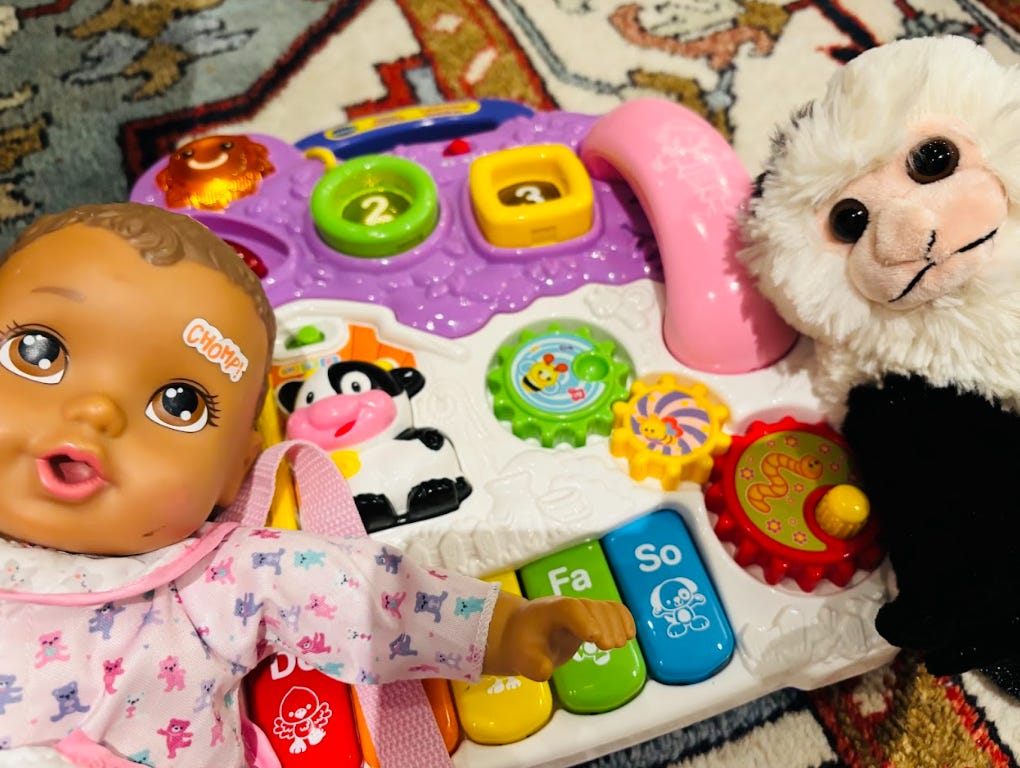I want to introduce you to Squishy and Monkey. Every evening, Squishy, Monkey, my two-year-old daughter, and I hold a standing one-hour meeting before bedtime. This recurring sixty-minute meeting always starts the same way—Monkey (that’s me) calls Squishy (my daughter) with some kind of request or responsibility. Tonight, Monkey was hungry and asked Squishy to whip up some food.
What follows is an hour of deep conversation, cooking, catching up on the day’s events, sharing milk and tea, and sometimes even a nighttime drive in Squishy’s hot pink convertible. It’s a mama, daughter, Monkey, and Squishy meeting—no one else invited. My husband and two older kids are thrilled they don’t have to join. For them, this hour is a chance to decompress, catch up on their day, or simply do nothing.
At first, I was excited to join these nightly playdates and fully engaged in the fun. But as they became a routine, I found myself trying to redirect my daughter to something else. I’d encourage her to involve her older siblings or even play with Monkey and Squishy by herself. But my attempts always failed. Her request, uttered in that soft little voice with big, hopeful eyes, was always the same: “Mama, play with me.”
It wasn’t a question. It wasn’t even a request. It was somewhere between a plea and a joyful anticipation: Will Mama engage or make an excuse?
The Struggle to Play
99% of the time, I say, “Of course, Mama will play!” But wow, is it hard to focus.
Why was an hour of imaginative play so challenging? I consider myself a capable person—yet when it comes to pretend play, I find it so difficult. I’m tired, and the idea of pretending to take a pet monkey to the grocery store feels like climbing a mental mountain. I have to turn off the never-ending to-do list in my head, ignore the mess in the house, set aside my phone so I’m not tempted to multitask, and then face the reality that I don’t have a naturally playful personality.
In fact, it feels like every ounce of my ability to play left my body a long time ago.
When Play Feels Unproductive
Reflecting on why I struggle with play, it all comes back to one thing: productivity. I know I’m spending valuable, relationship-nourishing time with my daughter, building core memories she’ll cherish forever. But deep down, I feel like I’m losing time I could spend being “productive.”
There’s this horrible undercurrent that I should be crossing something off my never-ending to-do list instead.
Growing up, play wasn’t something my family nurtured or emphasized. My mom was a day trader, and my dad an electrical engineer. The soundtrack of my childhood wasn’t cartoons or laughter—it was CNBC playing in the background. Success was measured by hard work and financial achievement. In my household, the “American Dream” was the ultimate goal.
When Play Feels Silly—or Even “Unprofessional”
As I reflected on my struggles, I asked myself a simple but unsettling question: When have I ever initiated playfulness? Sadly, I couldn’t come up with an example.
I’d like to be the mom who ambushes her kids with water balloons on the last day of summer or belts out trending dance moves in the kitchen with her tween daughter. But that’s not me. It feels silly, foolish—even… unprofessional. Yes, “unprofessional.” As absurd as it sounds, that word crept into my thoughts, as if professionalism has any place in the home.
I know it doesn’t, but the feeling lingers.
At first, I told myself this was just my personality. I’m stoic, serious—not everyone is playful. But eventually, I admitted the truth: I didn’t value play. My beliefs about it, not my personality, were at the root of my struggle.
Reframing Playfulness
To rediscover play, I had to reframe how I thought about it. Play isn’t frivolous or childish—it’s essential. It’s not about achieving something or crossing an item off a list. It’s about engaging in the moment, finding joy, and nurturing connection.
Play doesn’t have to be extravagant. It can be a simple moment of imagination, a burst of laughter, or a shared silly story. When I let go of my belief that play must have a purpose or a result, it became easier to lean in. Playfulness isn’t the opposite of productivity—it’s the antidote to burnout.
Rediscovering Play and Mental Health
The benefits of play extend far beyond building memories with my daughter. Engaging in playfulness reduces stress, enhances emotional well-being, and creates mental space to recharge. Play allows me to be present, shedding the overthinking and hyper-productivity that can drain mental energy.
For overthinkers and the burned-out, play offers a reset button. It’s a reminder that not everything in life needs to be serious or purposeful. Playfulness is a powerful way to reconnect with creativity, improve focus, and, most importantly, avoid the trap of overwork.
A New Perspective
Every night, when my daughter says, “Mama, play with me,” she’s teaching me something far more valuable than I ever expected. She’s showing me that play is not just for her—it’s for me too. It’s a chance to set aside the weight of responsibility and rediscover the simple, joyful act of being present.
Play may not come naturally to me, but it’s something I’m learning to value. Because in those moments with Squishy and Monkey, I’m not just building memories for her—I’m also reconnecting with a part of myself I thought I’d lost.
And that, I’m learning, is the true power of play.
Until next time, take care of yourself and those around you.
In Partnership,
Nabeela
"When was the last time you allowed yourself to truly play—not for a purpose, but just for the joy of it?" Leave a comment and let us know!
If you found this insightful or useful please share, like and comment.
If you would like to learn more about the worlds unhealthy relationship with work, success, achievement and discover ways to get off the burnout loop, check out some of my other posts below.








Love this
Thanks for sharing your experience about that topic, I can totally relate to every word of it. I think that what happens when you are an achiever by nature, you could barely enjoy non-achieving activities. A huge mindset shift is needed here, to continuously remind ourselves to pause and enjoy, and reimagine success (I could not find more descriptive word for it)